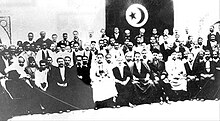Ksar Hellal Congress
| 1934 Neo Destour Congress مؤتمر قصر هلال |
|
|---|---|
 |
|
| Genre | Party Congress |
| Date(s) | March 2, 1934 |
| Location(s) | Ksar Hellal |
| Country | Tunisia |
| Next event | Court Street Congress |
| Participants | 60 Delegates |
| Organized by |
Habib Bourguiba Mahmoud El Materi Tahar Sfar Bahri Guiga M'hamed Bourguiba |
|
Outcome Creation of the Neo Destour party Renewal of the Tunisian national movement Colonial repression of 1934 |
|
The Ksar Hellal Congress was the first and founding congress of the Neo Destour party. The 1934 Neo Destour Congress was organized by the secessionist members of the Destour party, in Ksar Hellal, on March 2, 1934. It ended, that very night, with the creation of a new political party.
Upon the weakening of the Destour, that adopted a "shy" policy towards the Residence, the colonial French administration in Tunisia, a new generation of provincial thirties, with a European education and a close relationship with the French socialists, emerged. Mainly compounded of Habib Bourguiba, Mahmoud El Materi, Bahri Guiga, Tahar Sfar and M'hamed Bourguiba, it acquired a huge popularity thanks to its bold articles in newspapers, such as L'Action Tunisienne. However, the differences they had with the elders of the party led them to resign from the executive committee, the party's leadership, following the Tunisian naturalization issue.
The congress was held on March 2, 1934 to discuss the continuity of this youth's activism which ended with the founding of their own new political party, the Neo Destour, starting, thanks to its new methods, the renewel of the Tunisian nationalism and its movement.
There were numerous reasons leading to the birth of the Neo Destour: The Great Depression and its impact in Tunisia, in the early 1930s, the reactions denouncing the international eucharistic congress of Carthage, held to celebrate the hundredth anniversary of the French colonization of Algeria, the Tunisian naturalization issue but mainly the policy and behavior adopted by the Destour towards these events. Indeed, the party activism decreased in the midst of the 1920s, precisely on January 29, 1926, when "scoundrel decrees" were enacted by the Residence, the French colonial administration. In result, the first exclusively Tunisian labour union, the General Confederation of Tunisian Workers (GCTW), founded by Mohamed Ali El Hammi, was dissolved. Furthemore, nationalist newspapers such as Ifriqiya, Al-Asr, Al Jadid and Le Libéral were prohibited. The party soon bursted in pieces with the departure of Hassen Guellaty and Mohamed Noomane, who founded the Reformist Destourian Party, but also Farhat Ben Ayed, who created the Independent Destourian Party. In this context, a new generation of nationalists emerged.
...
Wikipedia
